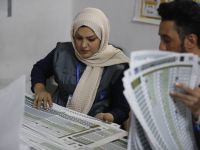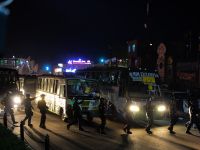Unless the Israelis lift their blockade of the Gaza Strip soon so he can return to his job near Tel Aviv, construction worker Raed Al-Dara says he will be forced to join the stone-throwers who each day take on the Israeli troops at the border crossing near Erez.
"It's better to throw stones than to become a beggar or a thief," said the bearded 34-year-old Al-Dara, whose seven-member family squash each night into the sole bedroom of their tiny house in the run-down heart of this UN-run refugee camp near Gaza City.
Since the Israelis placed a tight clamp on the border September 28 following the start of the Intifada, or Palestinian uprising, Al-Dara has, like about 35,000 other Gaza Strip Palestinians employed in the Israeli construction and agricultural sectors, not been able to earn his daily 180 shekels (45 dollars).
And it's beginning to show, as the increasingly frustrated Al-Dara has been asking his family to further draw their already tight belts.
His wife, 32-year-old Amera, said she has stopped buying fruit, has altogether cut out luxuries -- such as the weekly treat of a kilogram (two pounds) of meat -- and the children won't be getting any new warm clothes for the coming winter.
The coming month of Ramadan -- starting toward the end of November -- promises to be a bleak one, she added.
"Normally we have a feast at the end of each day of fasting; this year there won't be any feasting."
If individuals are hurting, the entire Palestinian economy is slowly choking to death, said economist Sala Abdel Shafi.
Loss of earnings by those who normally work in Israel are running at 1.5 million to two million dollars a day, said Shafi, whose Palestine Trade Center is at the forefront of foreign investment promotion in the Gaza Strip.
Those foreign investors who had shown tentative interest in Gaza have now been scared off and are unlikely to return for years, Shafi said.
Inside the Strip itself, the closure of the borders has paralysed the construction and textile industries -- both reliant on raw materials from Israel -- while the transport sector, with no workers to move to Erez for their daily crossing, has been reduced to a stutter.
"We estimate that 30,000 to 40,000 jobs have been lost within the Gaza Strip itself, bringing unemployment to between 40 and 50 percent," Shafi said.
The picture gets bleaker.
Exports amounting to around 400 million dollars a year to Israel -- which takes 90 percent of Gaza's main export products of textiles, vegetables, flowers, strawberries and furniture -- have come to a costly halt.
Two projects important for the future development of Gaza, the construction of a port and of an electricity plant had ground to a stop.
"Israel is suffocating us," said Shafi. "We have been working hard for the past six years trying to get investors to come to the Gaza Strip, now we are back to square one."
On the ground, people are dipping into their savings -- causing liquidity problems in banks this week -- and had reduced their spending to the basics.
He pointed out, however, that Israel, too, was suffering, with its construction and agricultural sectors battling to cope without the Palestinians, and its main export market -- the Gaza Strip and West Bank -- now cut off.
Shafi said commercial enterprises are hoping to be given some sort of compensation by the Palestinian Authority, which will be in charge of dispensing the proceeds of a fund to aid Palestinians set up during the Arab summit in Cairo a week ago.
Al-Dara, whose main dream is to be able to move into a bigger house so that his children -- especially his 14-year-old daughter -- won't have to squeeze into the marital bedroom every night, is under no such illusion.
"That money is for the families of martyrs and those wounded in the Intifada," he said.
Both he and Shafi point out that the Gaza Strip has survived blockades by the Israeli in the past, and will survive this one.
"The Intifada must continue," said the worker. "We will somehow survive."
"It's true that the people will survive the blockade," said the economist. "The main question is how long it will take us to recover from it" -- AL-BUREIJ REFUGEE CAMP (AFP)
© 2000 Al Bawaba (www.albawaba.com)







